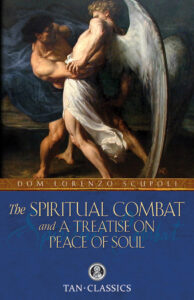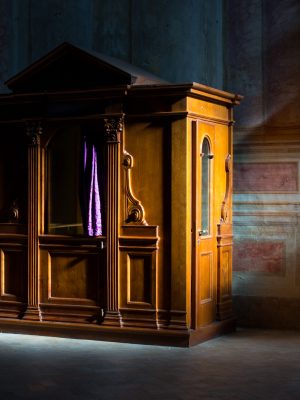When you realize that you have been wounded by sin, whether through weakness or malice, do not lose your courage or become panic-stricken. Turn to God with a great and humble confidence saying: “See, O Master, what I am able to do. When I rely on my own strength, I commit nothing but sins.”
Meditating on this, recognize the extent of your humiliation and express to Our Lord your sorrow for the offense committed. With an unperturbed heart, indict your vicious passions, especially the one that has occasioned your fall, and confess: “O Lord, I would not have stopped at this had not Your goodness restrained me.”
Give thanks to God, and more than ever give to Him the complete love of your heart. What generosity on His part! You have offended Him and, despite this, He extends His hand to prevent another fall.
With your heart full of confidence in His infinite mercy, say to Him: “O Master, show forth Thy Divinity and pardon me! Never permit me to be separated from Thee, deprived of Thy help; never permit me to offend Thee again!”
After you have done this, do not upset yourself by examining whether God has forgiven you or not. This is a complete loss of time, an outcropping of pride, a spiritual sickness, an illusion of the devil who seeks to harm you under cover of an apparently good act. Place yourself in the merciful arms of God, and plunge into your usual duties, as though nothing had happened.
The number of times during the day that you fall cannot shake the basis of a true confidence in Him. Return after your second, your third, your last defeat, with the same confidence. Each lapse will teach you greater contempt for your own strength, greater hatred for sin, and, at the same time, will give you greater prudence.
This will dismay your enemy because it is pleasing to God. The devil will be thrown into confusion, baffled by one he has so often overcome. As a result, he will bend every effort to induce you to change your tactics. He frequently succeeds when a strict watch is not kept over the tendencies of the heart.
The efforts expended in conquering yourself must correspond to the difficulties encountered. A single performance of this exercise is not sufficient. It should be frequently repeated though but one fault has been committed.
Consequently, if you have fallen, if you are greatly perturbed and your confidence is shaken, you must first recover your peace of mind and confidence in God. Raise your heart to Heaven. Be convinced that the trouble that sometimes follows the commission of a fault is not so much a sorrow for having offended God, but is a fear of punishment.
The way to recover this peace is to forget, for the moment, your fault and to concentrate on the ineffable goodness of God and His burning desire to pardon the gravest sinners. He uses every possible means to call the sinners back, to unite them entirely to Himself, to sanctify them in this life, and make them eternally happy in the next.
This consideration, or others of its kind, will bring peace back to your soul. Then you may reconsider the malice of your error in the light of what has been said above.
Finally, when you approach the sacrament of Penance—I advise you to do this frequently—recall all of your sins and sincerely confess them. Reawaken your sorrow for having committed them, and renew your resolutions to amend your life in the future.
This article is taken from a chapter in The Spiritual Combat and A Treatise on Peace of Soul by Dom Lorenzo Scupoli, which is available from TAN Books.









